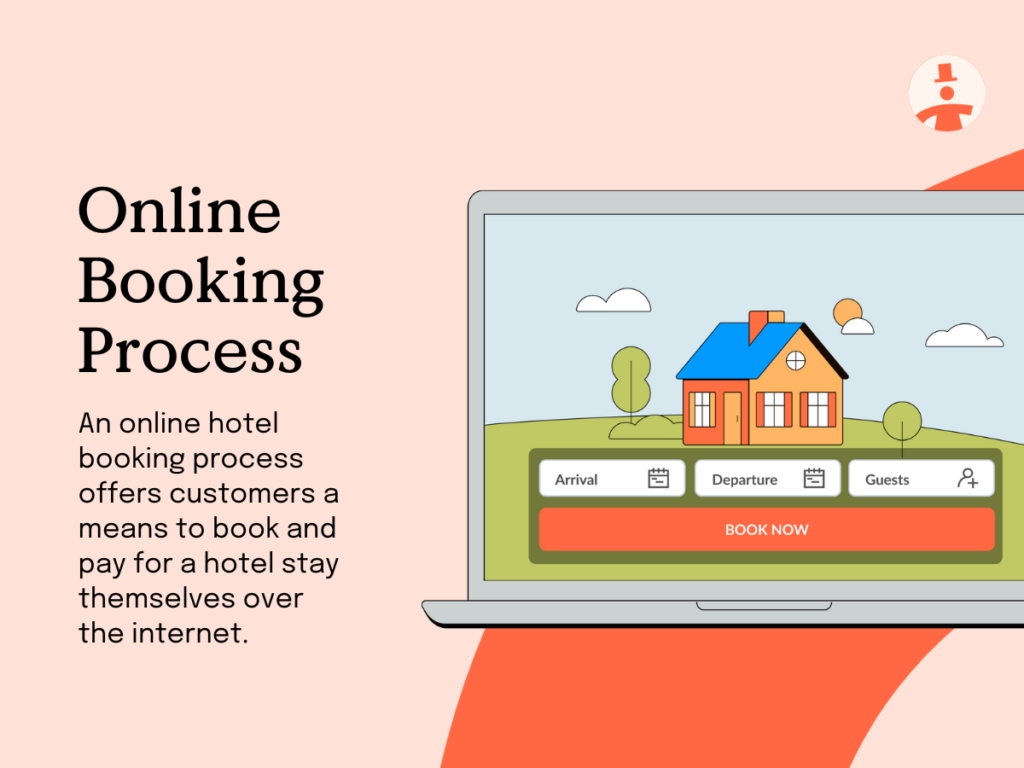What is an online booking process?
An online hotel booking process offers customers a means to book and pay for a hotel stay themselves over the internet.
Offering travellers greater autonomy and control over their plans, online bookings have long been the dominant booking method for hotels, to the point that 86% of people in a study said they typically make their travel bookings online.
What are examples of online booking? The online booking process for a hotel can take two main forms: direct or third-party. Direct online bookings see customers making reservations through your hotel website, while third-party online bookings see customers use other online booking channels, such as OTAs.
If you don’t make it easy for them to book a stay with you, then you’re losing out on the vast majority of potential online bookings!
Enhance the value of every direct booking with Little Hotelier
Little Hotelier’s online booking engine grants you total control over your website booking process, including the ability to offer add-ons and upgrades to increase the value of each and every booking.
Learn moreWhat is needed in online booking for hotels?
When you boil it down, a hotel needs just two things to begin accepting direct bookings online:
- A website
- An online booking tool
In Little Hotelier you get both of these elements in a single solution. Our hotel website builder makes it simple for a hotel to build a beautiful and fully functional hotel website, and our online booking engine ensures that the website can take bookings from visitors.
What is the process of online booking?
The online booking process is more than keying in details and making payment. By understanding the complete customer journey, a hotel can ensure that it is designed to attract guests, secure bookings and create loyal customers.
What are the steps in creating a booking? Here are eight of the most important.
Step 1: Research
The online hotel booking process almost always begins with research on the best available hotel option. This often begins by simply typing ‘Hotel [DESTINATION]’ into Google, making SEO a key consideration for all hotels.
Step 2: Compare the options
Once a traveller brings up a few options, they’ll compare them to find the best. Quality, price, location, suitability and availability are some of the key considerations.
Step 3: Choose a hotel
The traveller makes a decision on where they’d like to stay, and also decides where they will book: directly with the hotel, or through another booking channel like an OTA. Price is the key driver at this point of the process.
Step 4: Enter details
As part of the online hotel booking process a guest will be asked to fill in their details. To minimise cart abandonment you should ask for minimal information at this point of the process – collect detailed info during check-in instead.
Step 5: Make payment
The customer will be asked to pay for the booking, or to provide credit card details in order to secure it.
Step 6: Receive a booking confirmation
The guest will be sent a booking confirmation to verify that the booking has been secured. This is a great opportunity to give the guest any destination, property or check-in info they may need or want.
Step 7: Arrive & check in
When the guest checks in, take the opportunity to upsell them to extra services and room upgrades, and to secure extra information that may be useful in marketing efforts later.
Step 8: Checkout and post-stay engagement
At check-out, ask the guest to review your property (particularly if they had a great time). Into the future, craft compelling communications that will entice them to stay with you again.

How to improve your online hotel booking process
Being online is the key to getting more direct reservations at your small hotel, bed and breakfast, inn or guest house. You simply can’t do without it.
Consider that:
- 9 in 10 holidaymakers carried out research before booking their last trip.
- Just 1% of holidaymakers say they do not use the internet for holiday planning.
- 86% of people in a study said they typically make their travel bookings online.
So how can you make sure that you delight your guests each step of the way?
Here’s how to optimise your online booking process from start to finish, so that your guests love you from the very first click.
1. Tug at their heartstrings
The best way to sell is by evoking some type of emotion. At your bed and breakfast, the best type of emotion to trigger is desire – a desire to stay at your property, for whatever emotional reason will resonate with them most.
It really depends on your type of property, and who you are trying to attract.
- A couple = relaxation, romance, privacy.
- A family = fun, activities for kids, pram hire.
- Business travellers = WiFi, facilities, gym, transport, coffee shops.
- Leisure travellers = what’s on in town, distance to nearby attractions.
To trigger emotion you need to make sure that guests want to picture themselves comfortably staying at your property for the duration of their break.
Much of the time they spend while they’re at your destination won’t be at your hotel – if they’re there on business, it will be spent at a conference; if they’re there for a family holiday, they’ll be out and about doing what the kids want to do; if they’re there for a couple’s escape, they’ll be looking for romantic ways to spend their time.
This is why your website needs to contain comprehensive information about your local area – they just won’t spend too much time at your bed and breakfast!
Leisure travellers want to know what your area has to offer them so that they can make the most out of their stay. Highlight your destination’s culture and history, and provide tips on what they can do.
2. Sell the property
No, don’t literally sell your property – but market it effectively to your guests!
- Use high-resolution images to make them truly want to stay with you. Your photos must be of high quality. Here are some tips on how to take excellent photos of your property.
- Describe your property’s history, services and facilities. Your accommodation is unique. That’s why your guests aren’t staying at large hotel chains! Highlight what makes your property special, and let guests feel like they are really getting to know you.
- Simplify pricing. Display your hot deals quickly, and allow international guests to check your rates in the currency of their choice.
- Make sure there are reviews from other travellers, and social plugins from sites like TripAdvisor. This adds credibility to your business, and guests will feel like one of many who have chosen to stay at your property.
- Create a sense of urgency. For example, you can do this by reminding guests that room rates are 10% off for a limited time only, or that you’re low on available rooms.
3. Have simple navigation
When travellers land on your website, how quickly can they learn about what rooms you have available? How many steps does it take for them to make a reservation?
A study by SaleCycle found that 13% of people abandon their travel bookings online because the booking process is too complex.
Also having a website that is mobile-friendly is super important! Tnooz reports that more than 83% of leisure travellers have encountered a travel site that was not mobile-friendly, and of those, only 23% actually push through to complete their activity.
Locking in that booking shouldn’t be more than a few clicks away at any given time.
4. Provide comprehensive, up to date content
A lot of your website visitors will have found you through other booking sites, and have come to you to book directly (this is called ‘the billboard effect’). They may want to compare pricing and see if they can get a better deal by booking directly.
This is why it’s so important to make sure that all of your information (room descriptions, rates, photos, and amenities) are up-to-date across all of your online sales channels.
Amenities are especially important, with 77% of consumer booking decisions being influenced by available amenities (TripAdvisor).
To make your website even more useful, you can create pages containing advice on where to eat and what to do in your area, effectively acting as a concierge.
5. Smooth out the payment process
A lot of travellers abandon your website at this point. To encourage them to stick around, SiteMinder reports that your online payment process should be:
- Totally secure. Two thirds of US travellers are nervous about being redirected to pay.
- Simple. 63% of Chinese travellers say an overly complex payment page frustrates them.
- Flexible in terms of currency. A third of US + UK travellers would abandon the purchase if USD + GBP are not displayed.
6. Confirm their booking
Your small hotel’s reservation system should send an automatic email immediately after your guest enters their details to make a booking.
Usually, a credit card is required, so the purpose of this email is to reassure your guests that the reservation was successful.
- 96% of both Australians and Germans say email confirmation is very important.
- This drops to 91% for UK shoppers followed by 87% of French travellers.
- 81% of US travellers agree with the need to receive a booking follow up.
- 49% of Chinese travellers say receiving confirmation is very important.
A confirmation email gives them peace of mind that your hotel is legitimate and their sensitive financial data is safe with you.
Of course, this is only one of the several automated emails that you should be sending guests.
7. Alleviate buyer’s guilt
Right after your guest makes a booking, you need to reduce what’s known as ‘buyer’s guilt’! How? By reinforcing the fact that they’ve just made an excellent decision.
Your small hotel’s reservation system should send an automatic email immediately after your guest enters their details to make a booking.
Usually, a credit card is required, so the purpose of this email is to reassure your guests that the reservation was successful.
A confirmation email gives them peace of mind that your hotel is legitimate and their sensitive financial data is safe with you.Of course, this is only one of the several automated emails that you should be sending guests. You should send them more emails to get them excited about staying with you.
By Dean Elphick
Dean is the Senior Content Marketing Specialist of Little Hotelier, the all-in-one software solution purpose-built to make the lives of small accommodation providers easier. Dean has made writing and creating content his passion for the entirety of his professional life, which includes more than six years at Little Hotelier. Through content, Dean aims to provide education, inspiration, assistance, and, ultimately, value for small accommodation businesses looking to improve the way they run their operations (and live their life).
Table of contents
“Little Hotelier's mobile app is super useful. I use it daily to keep track of bookings and check my sales. It has certainly made my life easier”
Co-founder, El Samay Hotel Boutique








